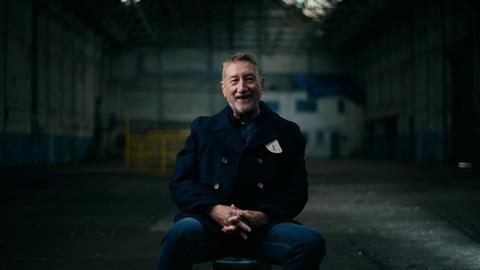Writer on Peaky Blinders’ return, Digbeth Loc’s international potential and his quiz show ambitions
The next generation of Peaky Blinders is “potentially a better iteration” of the story than the hugely successful show that came before it, according to creator Steven Knight.
“It’s going to be shot where it should be shot,” Knight tells Broadcast, in the now re-opened Digbeth Loc Studios in Birmingham.
The studios were reopened yesterday at a glitzy ceremony that saw Knight cut the ribbon in the presence of the mayor, with the relaunch coming alongside news that the hit drama would be returning for a further two series on the BBC and Netflix.
This time around, the series moves the action to the 1950s, following the story of the children from the original cast. And the reason is simple, says Knight: “We felt there was an appetite for more.”

“I tend to do things according to if I want to do them,” he continues. “In parallel with what’s been happening with Peaky, I’ve been developing this studio in Birmingham and we’ve got there now. So we’ll be able to shoot this next generation here, [partly] thanks to the BBC, which is investing in this region in a way that really makes things like this possible.”
Last month, the BBC announced it was doubling its production spend in the West Midlands from £24m to £40m a year by the end of 2027, something director general Tim Davie said would “deepen our partnership with the West Midlands to secure its place as a world-class centre for film and TV production.”
To that point, Knight is optimistic about Digbeth Loc’s global potential, suggesting that producers and decision-makers “whether they’re from the US or anywhere else” place most emphasis on getting the show made rather than where it is shot.
“It’s often to do with money - there’s no reason why not to do it in Birmingham,” he adds.
Knight’s ambitions for the studios are high and he says while they will be “financially attractive” for potential productions, there is also a focus on making the space both fun and collaborative.
“I’m trying to get Digbeth Loc to be a place where you can actually enjoy production.
“You’re next to the city centre, you can get a decent meal, a good cup of coffee. But it’s more than that.
“UB40 are recording their new album here, the Royal Shakespeare company is here, we’re talking theatre and dance. If a filmmaker comes to Birmingham they can mingle with all kinds of creatives and we need that creative hub where people of like minds can get together.”
Knight hopes that the production centre can entice a broad array of producers, and for him that isn’t just in drama, but across genres.
People are saying period drama is dead - that for me is proof that the absolute opposite is true
He teases that, having been one of the creators behind Who Wants to Be A Millionaire?, he is now working up a game show himself.
“That’ll be fun,” he adds, keeping further details under wraps.
For now, the focus is on Digbeth Loc Studios, with its state-of-the-art facilities being overseen by operator BBC Studioworks. New jobs are being created and BBC Studioworks’ business and marketing director Rebecca Williams says the organisation is “proud to play a role in this new chapter for the region’s creative industries.”
Commissioning conservatism
While Peaky Blinders’ return underlines the ongoing strength of the IP, Knight warns against commissioning conservatism, a topic he discussed in a recent interview with Broadcast.
“I don’t think commissioners or buyers have a moral or ethical view, they just want what works,” elaborates Knight.
However, he believes that “the original reason” a show may find success “is because it’s not about what was happening at the time - it’s down to the creative people who ignore or are unaware of what is supposed to be commercial.”
Knight points to Who Wants to Be A Millionaire?, highlighting that the hit series came out “at a time when every single commissioner and broadcaster was saying that quiz shows were dead. Take that as a lesson,” he laughs.
“Now people are saying period drama is dead - that for me is proof that the absolute opposite is true. You’ve got to start going in the opposite direction to the one everyone is going in.”






























No comments yet